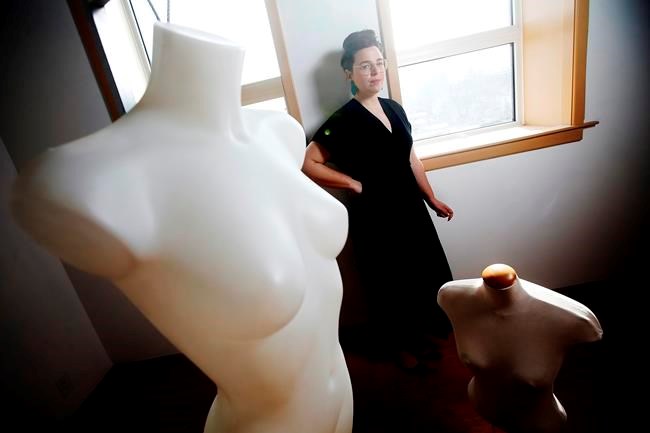MONTREAL — When Kate Sinclaire was 19, an ex-boyfriend posted explicit images of her online without her consent.
The pictures, and the comments about them, made her feel embarrassed, angry and ashamed.
That feeling of shame led her to question why she was feeling that way when she had done nothing wrong.
"Why am I ashamed about this?" she said in a recent interview.
Sinclaire, who is from Winnipeg, decided to confront her abuser and to begin making pornography that she said celebrates all genders and sexualities and helps people take pride in themselves. But she worries a parliamentary committee in Ottawa studying the porn industry could make it more difficult or impossible for people like her to keep working.
The committee, which is studying how to protect the privacy and reputations of people who appear on pornography websites, isn't interested in hearing from people who have a nuanced view on the topic, Sinclaire said, adding that she worries about what recommendations will come out of its work.
"I'm worried that it will make my work less feasible," Sinclaire said. "That elements of it could become illegal, or I could become criminalized."
Sandra Wesley, director of Stella, a Montreal advocacy group for sex workers, said when she asked to testify, "the response that I got back is that sex workers are not relevant to this conversation."
The Standing Committee on Access to Information, Privacy and Ethics, she said, is "only interested in hearing about instances of non-consensual videos or non-consensual sex being put on those platforms."
The committee is investigating the Montreal-headquartered pornography website Pornhub, which has been accused of hosting explicit videos of people posted without consent — including videos of alleged rape and child sexual abuse.
Executives of its parent company, MindGeek, have denied any wrongdoing and said their company is a "world leader" in preventing the distribution of content showing child sexual abuse and non-consensual acts.
Wesley said some of the people who have testified before the committee have ties to religious groups that oppose sex outside of heterosexual marriage or are anti-pornography activists.
Committee chair Chris Warkentin, a Conservative MP in Alberta, said he has received "dozens and dozens and dozens" of requests to testify.
"Committee members have prioritized those who they have wanted to hear from initially," he said. "This study is ongoing and to my knowledge, nobody has been formally told that they will not appear."
The committee is encouraging people to file written briefs, he said, adding that those briefs will be considered as testimony.
Wesley, however, said she thinks those briefs won’t get attention.
"For us, the need to testify verbally in front of the committee is extremely important," she said. "We know that our brief will be ignored."
Traffickinghub founder Laila Mickelwait has recently appeared before the committee.
In an email, Mickelwait said her organization is not religious and aims to hold online porn giant Pornhub "accountable for enabling and profiting from mass child exploitation, sex trafficking and non-consensual content."
Traffickinghub describes itself on its website as "powered by" Exodus Cry, a Christian organization that opposes the "commercial sex industry" on religious and moral grounds.
Until 2016, Exodus Cry was listed as a ministry of the International House of Prayer, an evangelical church in the United States, famous for its 24 hours a day, seven days a week prayer room in Kansas City, Mo. Exodus Cry spokeswoman Lexie Smith wrote in an email that the group is not formally affiliated with the International House of Prayer.
Jenn Clamen, the national coordinator for the Canadian Alliance for Sex Work Law Reform, an organization of more than 20 groups from across Canada that represent workers in the sex industry, including Stella, said she fears the committee will recommend regulations requiring online sex workers — including those who work alone — to provide more identifying information to websites where their work appears.
Multiple briefs filed with the committee have called for pornography companies to be required to use third parties to verify the identities of people who appear in videos.
Clamen said she's concerned about how that kind of data would be stored.
"There's a lot at risk when people work in the industry," she said.
"There's all kinds of people, in all different kinds of professions that have started to do online sex work," she said. "Should any of their employers ever find out they're working in the industry, they are obviously risking their straight jobs."
Websites with identifying information about sex workers have been hacked in the past, Clamen said.
"It is absurd to even consider additional regulations without understanding how those regulations impact on the people in the industry in terms of health and safety," she added.
Warkentin said the committee's next steps haven't been decided.
"That will be determined by the consensus of the committee members and that has yet to be finalized," he said.
Meanwhile, Sinclaire said because her work appears in the United States, she's required to have identifying information about performers on file. The physical location of those files is legally required to appear on her website and in every video she makes. On multiple occasions, she said, men have used that information to find her studio. She said one time she had to call police.
She said she hopes the committee will recommend that steps need to be taken to help victims of sexual crimes feel comfortable coming forward and that sex education needs to focus on consent and boundaries.
But she said she isn't hopeful that will be the result.
"A lot of the time, people make well-intentioned laws or rules that end up hurting more people," she said.
This report by The Canadian Press was first published March 14, 2021.
———
This story was produced with the financial assistance of the Facebook and Canadian Press News Fellowship.
Jacob Serebrin, The Canadian Press



